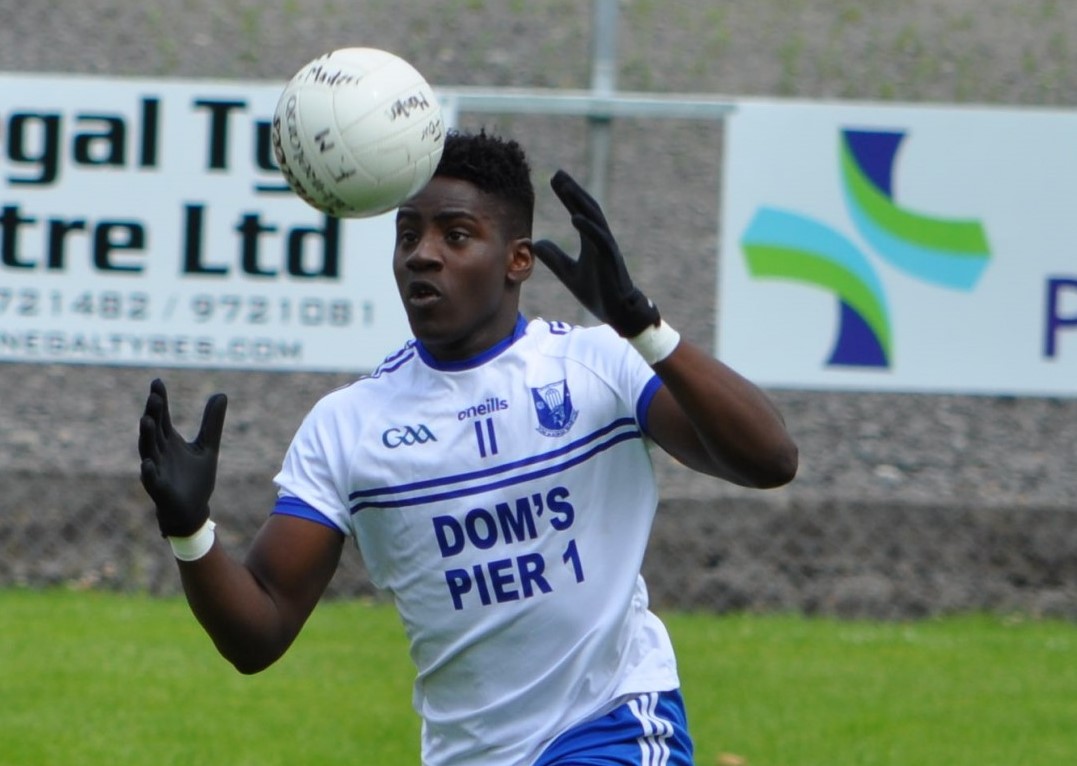By Conor Breslin
A BLACK 24-year-old player from Donegal has explained how he felt let down by the GAA after experiencing a number of racial incidents while representing his club Four Masters.
Rahman Balogun was born in Italy to Nigerian parents. Due to the lack of citizenship, Rahman and his family were sent as asylum seekers to Ireland. They settled in Dublin for a number of years before relocating to county Donegal when Rahman was 10.
“Due to circumstances with my family I was fostered in Donegal while my parents were sent back to Nigeria. I was born in Italy, but I didn’t have citizenship in either Italy or Ireland, so I was an asylum seeker in two European countries.”
Rahman described his experience of the area and people he grew up with in Donegal as far more accepting and understanding than his life in Dublin. Though, when it came to playing sport, people’s attitudes quickly changed, and Rahman remembers the horrific verbal abuse he received from opponents growing up.
“Whether it was a basketball court, soccer pitch or GAA pitch, you name it, I was racially abused but when you’re growing up you’ll let it slide to almost fit in and not cause any fuss.
“It’s only now you realize how wrong it was and how people should’ve been there to do something or stop it.”
As an adult, on two separate occasions Rahman recalls how the GAA failed to handle him being racially abused on the pitch and the first time he took a stance and stood up for himself.
“Two years I was playing a senior league game for my club Four Masters.
“As the match went on, the game got very heated and a few small fights started but nothing major. Before I knew it, one player grabbed me, threw me to the ground and called me a ‘black f**ker’.”
“As I said, when you’re growing up, you’ll let that form of abuse slide, but when you’re in you’re 20s you have a different attitude to how you should be treated.
“For some strange reason that day I just snapped. I felt like I wanted to beat this guy up which is something I have never felt before. I instead went mad, took off my jersey and just walked off the pitch.
“The overall emotion by people at the time was to go to the media and tell them what happened, but I remember thinking at the time I didn’t want to make a big fuss and just wanted the issue quietly addressed by the club and the GAA.
“I don’t think too much was done. A few months later a similar incident happened again on the GAA pitch in a league match when a player told me to go back to my own country. Again, I snapped, and this time kicked him on the ground before walking off the field. I’ve worked and lived in this country all my life.
“The difference this time was, because I didn’t make a fuss the first time, everyone presumed I would just take this on the chin. Nothing was done to tackle the issue. It wasn’t even brought up to me after the match.
“People’s mindsets were to simply not get involved. A lot of people probably just took it as a sly comment, whether it was or not, I felt it’s still racist and still bothers me that nobody off the pitch or in the GAA did something.“
After a long thought, Rahman has since returned to play for his local club but feels now is the best time to address the hardship that he underwent as well as the scenarios that were handled so badly.
He is satisfied that now is the time for the GAA to stomp down hard on the issue of racism although it should’ve been tackled long ago.
“With all that is going on now in the world, this is the only time I feel I will get my story out there. One thing I can say is that if anyone ever asks me, I am from Donegal and proud to be from Donegal, it’s my home, but I also have bad memories about this place.
“I love the fact that GAA players of all different backgrounds are coming out now to talk about race in the GAA. They have a huge platform and presence to make themselves heard. I just hope that they know how bad it is at all levels of the GAA and not just on a county level.”
Rahman said that it was vital that people of all races were supporting the current protests against racism all over the world but it’s also important to look at our own issues at home and not pass the blame onto other countries.
“People like to use the excuse by pointing fingers saying the USA is worse for racism, and yes, it is, but that doesn’t excuse the fact that Ireland is bad too. A lot of people in Ireland don’t get it, and why would they.”
comment@gaeliclife.com
Receive quality journalism wherever you are, on any device. Keep up to date from the comfort of your own home with a digital subscription.
Any time | Any place | Anywhere












